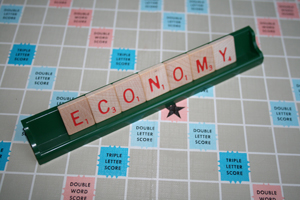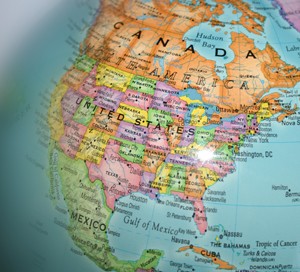Well, we’re still here. Despite the seemingly best efforts of the leaders of the United States and North Korea – the world is still turning. But September was a month of ‘another day, another North Korean rocket flying over Japan’ and it ended with Kim Jong-un threatening to explode a nuclear bomb over the Pacific. Small wonder that South Korea is creating a special military unit with only one aim, which does not bode well for Kim.
Meanwhile, central bankers have warned that, well… they seem to have lost $13tn. The Bank for International Settlements has warned that this amount may be missing from global balance sheets because, apparently, international standards do not require such a trifling sum to be included. The authors of the report say that the debt ‘remains obscured from view’ – which rather makes $13tn sound like your TV remote.
Throw in the devastating effects of Hurricanes Harvey, Irma and Jose and September was a month where it was difficult to find any good news. At least with it being Party conference season there may be some positive policies announced: although it could be said the Prime Minister is clinging to a life raft with the sharks circling, as she makes her major speech.
UK
September saw the Labour Party getting together in Brighton, which could either be viewed as a triumph for Jeremy Corbyn and his ‘government in waiting’ as they outlined a clear vision for a stronger, fairer Britain or a party that would bankrupt the country within three months of taking office, depending on your view.
Meanwhile, the Conservatives are in Manchester, as Theresa May seeks to re-assert her authority following the disastrous General Election campaign. Having spent virtually all the election campaign deriding Labour’s ‘magic money tree’ Theresa May seems to have, well, magically found one at the bottom of her garden. Student loans, Help to Buy, lifting the public sector pay cap, £1bn to keep the Democratic Unionists onside… Philip Hammond’s Autumn Budget – now scheduled for 22nd November – is certainly going to be interesting.
Away from the Westminster plans and plots, the month started well as figures for August showed that UK manufacturing had hit a four month high, and later in the month it was reported that it had moved up one place in the ‘league table’ to become the 8th largest in the world. Unfortunately, the service sector couldn’t match this progress as the August figures recorded the slowest growth for 11 months.
Nevertheless, UK unemployment continues to fall – it is now down to 4.3%, down from 4.4% in the previous quarter and the lowest level since 1975. However, wages continue to stagnate, and with inflation hitting 2.9% many people are still seeing a fall in real wages.
What of interest rates? The month started with a suggestion from the Bank of England that there would be no rises for ‘at least a year:’ however by the end of the month Governor Mark Carney was expecting a rate rise “in the near term” – which could apparently be as early as November.
…And there was more gloom to end the month as credit ratings agency, Moody’s, downgraded the UK’s credit rating from Aa1 to Aa2, following earlier downgrades by the other major agencies. UK growth for the second quarter of the year was also revised down to 1.5% from an earlier 1.7%.
How did all this translate to the stock market? The FTSE 100 index of leading shares was down just 1% in September, opening the month at 7,431 and closing at 7,373.
Brexit
News for the Brexit part of the commentary this month wasn’t hard to come by. ‘Michel Barnier vows to ‘educate’ UK over consequences of leaving’: ‘May has accepted a £50bn exit bill’: ‘Europe to block Brexit trade talks until December’: ‘May goes to Canada to seek trade deal’… And so it goes on: but as in previous months, the end result seems to be very little progress, despite Theresa May’s speech in Florence.
It was thought that progress might well speed up after the German elections but as you will read below, these have been anything but decisive, and Angela Merkel will have plenty of domestic issues to consider before she thinks about Brexit.
In the same way that the Labour Party are now apparently ‘war-gaming’ a run on the pound should they come to power, so the Government are supposedly doing the same with the prospect of ‘no deal’ by March 2019. It is looking increasingly likely…
Europe
The big news in Europe was the German elections, held on the last Sunday in September. They were largely seen as rubber-stamping another four years as Chancellor for Angela Merkel: four more years with ‘Mutti’ leading Germany and – by extension – Europe.
In the event, the Christian Democrat vote was down nearly 10% to 32.9%: the Social Democrats recorded their worst result since the war, with just 20.5% of the vote, and in third – with 12.9% of the vote – was the right-wing anti-immigration party, Alternative fur Deutschland (AfD).
Where did that leave Merkel? Substantially weaker: the Social Democrats have gone into opposition to lick their wounds, and Merkel is likely to be left with what is scathingly referred to as ‘the Jamaica Coalition.’ Based on the colours of the respective parties, this is a coalition between the Christian Democrats, the Free Democrats (roughly equivalent to the Liberals in the UK) and the Green Party.
Will it work? There could be months of wrangling, with Greens leader Katrin Goring-Eckardt saying in a TV debate, “Naturally there’s a lot that divides us. I’m not sure that we will succeed.” Does this leave a vacancy for a new de facto leader of Europe? French President Emmanuel Macron certainly seems to think so…
Despite this uncertainty, there was good news as the ECB predicted the fastest Eurozone growth since 2007, forecasting economic growth of 2.2% for this year It’s unlikely this figure will be repeated at Ryanair as the company pulled off one of the biggest PR disasters of recent times, cancelling any number of flights thanks to not organising their pilots’ holidays properly. The bill won’t reach the $30bn that the emissions scandal has supposedly cost Volkswagen but you suspect that the company will take a long, long time to recover.
At least, there were no shades of Ryanair for Europe’s leading stock markets: the German DAX index closed September up 6% at 12,829 and the French market jogged happily along in its wake, rising 5% to finish at 5,330.
US
The damage done to the Caribbean and the southern states in the US by the recent hurricane season has been well-documented. One estimate now puts the repair bill in Texas at $180bn following Hurricane Harvey.
It seems heartless to turn from that to Facebook’s cash mountain – but I am duty bound to report that the company’s revenues and profits soared in the second quarter, with more than 2bn people now logging into the site each month. The firm’s revenues hit $9.3bn for the April to June period, up 45% year-on-year, as profits for the quarter rose to $3.9bn.
It was mixed news for Apple, as they suffered a ‘major data breach’ ahead of the launch of the iPhone X, but then unveiled a phone that was seen as a major leap forward and ‘the future of the mobile phone.’ Or in many cases, the future of parents asking their children for help…
Worryingly, Toys-R-Us filed for bankruptcy protection: with an increasing number of malls threatened with closure over the next five years, you have to ask if this is a straw in the wind – and whether Amazon and other online retailers will now do to out of town shopping what they have done to so many high streets in the US and the UK.
The Dow Jones Index chose to side with Facebook rather than Toys-R-Us, and it rose 2% in September to end the month at 22,405.
Far East
There were two significant events in the Far East in September. In Japan, Prime Minister Shinzo Abe called a snap general election, looking to take advantage of opposition disarray and seeking support for his hard line against North Korea. Abe said the election would be a judgement on his spending plans and his handling of the Korean crisis. The election is due to be held on 22nd October and at the moment Abe and his Liberal Democratic Party have a comfortable lead in the polls. Then again we have seen other leaders with healthy poll leads call snap general elections…
We have written previously in this commentary about China’s mounting debt and credit problems, and in September credit ratings agency, Standard & Poor’s, cut China’s rating by one point from AA- to A+. This was down to worries about the build-up of debt in the country and puts China on the same level as Ireland and Chile.
The downgrade comes just a month before the Communist Party Congress, which is held only twice every decade and sets economic policy for the next five years: at the moment the Chinese Government has a target of 6.5% growth for this year.
Other than that, the rulers in Beijing were in the mood for banning things: bike sharing apps have now been banned in Beijing thanks to traffic chaos and safety concerns, and the government is also planning a ban on both petrol and diesel cars ‘in the near future’ as China looks to curb pollution and boost its electric cars industry.
Boosted by the likely return to power of Shinzo Abe, the Japanese market led the way in the Far East, rising 4% in the month to 20,356. The South Korean market was also up, albeit by only 1% to 2,394, while China’s Shanghai Composite Index was virtually unchanged at 3,349. The Hong Kong market fell back by 1% to end the month at 27,554.
Emerging Markets
One of the interesting things about writing this commentary is how a story which seemed crucial at the beginning of the month has been almost completely forgotten about by the end of the month. So it was in Emerging Markets, as September started with the BRICS summit – a meeting of the leaders of Brazil, Russia, India, China and South Africa. Chinese leader Xi Jinping told the delegates that an ‘open world economy’ was needed, with ever-increasing trade liberalisation. He told delegates that, “The development of emerging markets and developing countries won’t touch anyone’s cheese, but instead will diligently grow the world economic pie.” With China committed to massive investment in Pakistan you suspect that China and India may be squabbling over rather more important matters than pie and cheese in the long term…
Away from the kitchen and on the stock markets it was a good month for the Brazilian market, which was up another 5% to 74,294. The Russian index also did well as it attempts to regain some of the ground lost earlier in the year: it was up 3% in September to finish at 2,077. Not such a good month for the Indian market though, which closed down 1% at 31,284.
After an excellent year for the ‘And finally’ section of this report, September was a disappointing month. No-one accidentally locked himself in a cash machine, no Chinese toilets demanded facial recognition before they’d dispense loo roll and – only just back from holiday – there was no need for the new leader of Europe to spend thousands on make-up.
But there was an encouraging story from the world of technology, where the winner of the UK’s James Dyson Prize for Innovation was engineering graduate Ryan Yasin and his concept of ‘clothes that grow with your children.’ This is fantastic news for hard-pressed parents – and not just parents of toddlers. September is the month when many teenagers start university: they face the harsh reality of student loans and their parents face the equally harsh reality of ‘kitting them out’ with pots and pans and possibly even a textbook or two.
But at least new clothes won’t be an issue if Mr Yasin’s prototype clothes go into production. Freshers’ Week should be something to behold as everyone wanders round in their Thomas the Tank Engine tops and Mr Tickle trousers…

